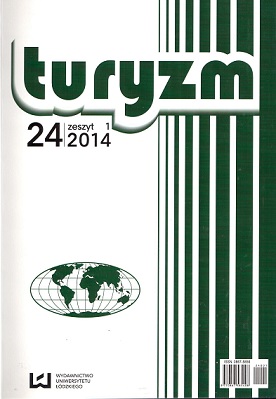Accessibility of tourism space from a geographical perspective
DOI:
https://doi.org/10.2478/tour-2014-0005Keywords:
accessibility, accessible tourism, tourism space, tourism geography, universal design, social model of disability, geographical model of disabilityAbstract
The accessibility of tourism space is becoming an increasingly significant issue in geographical research due to, amongst other things, demographic changes (an ageing population, growing numbers of people with disabilities) alongside guaranteeing a universal right of access to tourism. The nature of geographical research (physical, socio-economic) allows this issue to be viewed systemically. Drawing on the fields of geography and accessible tourism, this article presents the assumptions of a model which makes a systemic analysis of the factors conditioning the accessibility of tourism space possible. It also highlights the need for further research into the optimal level of detail in universal design principles which can be applied in tourism.
Downloads
References
BEST S., 2010, Leisure Studies. Themes & Perspectives, SAGE Publica tions Ltd, London.
Google Scholar
BUHALIS D., DARCY S. (eds) 2011, Accessible tourism. Concepts and Issues. Aspects of tourism, Channel View Publications, Bristol.
Google Scholar
BUHALIS D., DARCY S., AMBROSE I. (eds) 2012, Best practice in accessible tourism. Inclusion, Disability, Ageing Population and Tourism, Channel View Publications, Bristol.
Google Scholar
CHOUINARD V., HALL E., WILTON R. (eds), 2010, Towards Enabling Geographies: “Disabled” Bodies and Minds in Society and Space, Surrey, England, Burlington, VT, USA.
Google Scholar
DARCY S., 2010, Inherent complexity: disability, accessible tourism and accommodation information preferences, Tourism Management, 31, 6, pp. 816-826.
Google Scholar
DARCY S., PEGG S., 2011, Towards Strategic Intent: Perceptions of disability service provision amongst hotel accommodation managers, International Journal of Hospitality Management, 30, pp. 468-476.
Google Scholar
Europejska strategia w sprawie niepełnosprawności 2010–2020. Odnowione zobowiązanie w sprawie budowy Europy bez barier, 2010, KOM 636, Bruksela.
Google Scholar
http://spdn.pl/wp-content/uploads/2012/11/pdf-Europejska-strategia-w-sprawie-niepenosprawnoci-2010-2020.pdf 27.07.2013.
Google Scholar
FARIS R.E.L., DUNHAM H. W., 1939, Mental disorders in urban areas: An Ecological Study of Schizophrenia and other Psychoses, University of Chicago Press, Chicago.
Google Scholar
FOGGIN B., 2011, Tourism in the Leisure Lives of People with Disability, [in:] Accessible tourism. Concepts and Issues. Aspects of tourism, D. Buhalis, S. Darcy (eds), Channel View Publications, Bristol, pp. 98-122.
Google Scholar
IMRIE R., 2012, Accessible Housing: Quality, Disability and Design, Routledge, London.
Google Scholar
KACZMAREK J., STASIAK A., WŁODARCZYK B., 2008, Przestrzeń gościnna – kilka uwag o konkurencyjności regionów, [in:] Turystyka jako czynnik wzrostu konkurencyjności regionów w dobie globalizacji, G. Gołembski (ed.), Wyd. Akademii Ekonomicznej w Poznaniu, Poznań, pp. 136-150.
Google Scholar
KOŁODZIEJCZAK A., ZAJADACZ A., 2008, Dostępność infrastruktury i informacji turystycznej warunkiem poznawania obiektów krajoznawczych Wielkopolski przez osoby niepełnosprawne, [in:] Rola krajoznawstwa i turystyki w życiu osób niepełnosprawnych, A. Stasiak (ed.), Wyd. PTTK Kraj, Warszawa, pp. 193-202.
Google Scholar
Konwencja ONZ praw osób niepełnosprawnych z dnia 13 grudnia 2006 roku (rezolucja 61/106), http://www.unic.un.org.pl/dokumenty/Konwencja_Praw_Osob_Niepelnosprawnych.pdf 30.12.2013.
Google Scholar
KOSTROWICKI A.S., 1997, Przestrzeń – jej istota i zróżnicowanie, „Rzeki”, 6, s. 125-139.
Google Scholar
KOWALCZYK A., 2001, Geografia turyzmu, PWN, Warszawa.
Google Scholar
KOWALCZYK A., 2011, „Geograficzne” aspekty przestrzeni turystycznej (nowe spojrzenie na koncepcje przestrzeni turystycznej), [in:] Przestrzeń turystyczna: czynniki, różnorodność, zmiany, M. Durydiwka, K. Duda-Gromada (eds), Wydział Geografii i Studiów Regionalnych UW, Warszawa, s. 29-38.
Google Scholar
KRZYMOWSKA-KOSTROWICKA A., 1997, Geoekologia turystyki i wypoczynku, PWN, Warszawa.
Google Scholar
LISOWSKI A., 2003, Koncepcje przestrzeni w geografii człowieka, Wydział Geografii i Studiów Regionalnych, UW, Warszawa.
Google Scholar
LISZEWSKI S., 1995, Przestrzeń turystyczna, Turyzm, 5, 2, pp. 87–103.
Google Scholar
MICHOPOULOU E., BUHALIS D., 2011, Stakeholders Analysis of Accessible Tourism, [in:] Accessible tourism. Concepts and Issues. Aspects of tourism, D. Buhalis, S. Darcy (eds), Channel View Publications, Bristol, pp. 260-273.
Google Scholar
OLIVER, M., 1996, Understanding Disability: From Theory to Practice, Macmillan, Basingstoke, Houndmills.
Google Scholar
PEARN M., 2011, Heritage Sites: Attitudinal and Experimental Differences of Disabled and Able-Bodied Visitors, [in:] Accessible tourism. Concepts and Issues. Aspects of tourism, D. Buhalis, S. Darcy (eds), Channel View Publications, Bristol, pp. 201-213.
Google Scholar
Projektowanie uniwersalne. Objaśnienie koncepcji, The Norwegian Ministry of the Environment, 2007; http://www.niepelnosprawni.gov.pl 27.07.2013.
Google Scholar
RELPH E., 1976, The Phenomenological foundations of geography, Discussion Paper, series no. 21, December, University of Toronto, Department of Geography, Toronto.
Google Scholar
SAUTTER E.T., LEISEN B., 1999, Managing stakeholders: A tourism planning model, Annals of Tourism Research, 26 (2), pp. 312-328.
Google Scholar
Słownik współczesnego języka polskiego, 1996, B. Dunaj (ed.), Wyd. Wilga, Warszawa.
Google Scholar
STACHOWSKI J., 1993, O pojmowaniu przestrzeni w geografii turyzmu, Acta Universitatis Nicolai Copernici. Geografia, 24, Nauki Matematyczno-Przyrodnicze, 82, pp. 171-180.
Google Scholar
WANG Y., 2011, Ageing Travel Market and Accessibility Requirements, [in:] Accessible tourism. Concepts and Issues. Aspects of tourism, D. Buhalis, S. Darcy (eds), Channel View Publications, Bristol, pp. 191-200.
Google Scholar
WARSZYŃSKA J., JACKOWSKI A., 1978, Podstawy geografii turyzmu, PWN, Warszawa.
Google Scholar
WESTCOTT J., 2004, Improving information on accessible tourism for disabled people, European Commission, Luxembourg. http://ec.europa.eu 27.07.2013.
Google Scholar
WŁODARCZYK B., 2009, Przestrzeń turystyczna. Istota, koncepcje, determinanty rozwoju, Wyd. Uniwersytetu Łódzkiego, Łódź.
Google Scholar
WŁODARCZYK B., 2011a, Processes of tourism space formation, Turyzm/Tourism, 21, 1-2, pp. 59-65.
Google Scholar
WŁODARCZYK B., 2011b, Przestrzeń turystyczna – kilka słów o istocie pojęcia, [in:] Przestrzeń turystyczna: czynniki, różnorodność, zmiany, M. Durydiwka, K. Duda-Gromada (eds), Wydział Geografii i Studiów Regionalnych UW, Warszawa, pp. 15-27.
Google Scholar
ZAJADACZ A., 2007, Propozycja przekazu informacji o i na szlakach turystycznych osobom niesłyszącym przy zastosowaniu technik wizualnych, [in:] Szlaki turystyczne a przestrzeń turystyczna, P. Kuleczka (ed.), Wyd. PTTK Kraj, Warszawa, pp. 97-102.
Google Scholar
ZAJADACZ A., 2010a, Sposoby udostępniania obiektów dziedzictwa kulturowego niesłyszącym turystom, Turystyka i Hotelarstwo 16, pp. 155-168.
Google Scholar
ZAJADACZ A., 2010b, Czas wolny, turystyka i rekreacja osób niesłyszących w Polsce – zarys specyfiki problemu. Uwarunkowania i plany rozwoju turystyki, t. IV, ser. „Turystyka i Rekreacja – Studia i Prace”, 4, Wyd. Naukowe UAM, Poznań.
Google Scholar
ZAJADACZ A., 2011a, Subiektywna przestrzeń turystyczna w świetle biografii turystycznych osób niesłyszacych, [in:] Przestrzeń turystyczna: czynniki, różnorodność, zmiany, M. Durydiwka, K. Duda-Gromada (eds), Wydział Geografii i Studiów Regionalnych UW, Warszawa, pp. 109-118.
Google Scholar
ZAJADACZ, A., 2011b, Attitudes to social integration of deaf and hearing people during leisure time in Poland, [in:] Tourism Role in the Regional Economy. Social, Health-Related, Economic and Spatial Conditions of Disabled People´s Tourism Development, J. Wyrzykowski, J. Marak (eds), Wyższa Szkoła Handlowa we Wrocławiu, Wrocław, pp. 310-326.
Google Scholar
ZAJADACZ A., 2012, Turystyka osób niesłyszących – ujęcie geograficzne, Bogucki Wydawnictwo Naukowe, Poznań.
Google Scholar
Downloads
Published
How to Cite
Issue
Section
License

This work is licensed under a Creative Commons Attribution-NonCommercial-NoDerivatives 4.0 International License.










